Stanley McChrystal spends a lot of time writing these days.
The retired four-star U.S. Army general used to be in charge of Joint Special Operations Command (JSOC), launching teams of Navy SEALs, Rangers, Delta Force and other specially trained warriors on top-secret missions, hunting terrorists throughout Iraq. Then he was in charge of all U.S. forces in Afghanistan, where he started a counterinsurgency that eventually led to the mission that killed Osama bin Laden. But an infamous 2010 profile in Rolling Stone included remarks from the general and his staff that disparaged officials in the Obama administration, and McChrystal resigned as a result.
Related: Rohn: 7 Personality Traits of a Great Leader
Now 61, he stays busy with other things, adapting to his new environment. He has a leadership consulting company, the McChrystal Group, based in Alexandria, Va. He teaches international relations at Yale. He chairs a committee at the esteemed Aspen Ideas Festival, where journalists, innovators, politicians, diplomats, entrepreneurs, artists and writers flock yearly to discuss a better future. He flies all over the world, giving speeches to think tanks, corporations and universities.
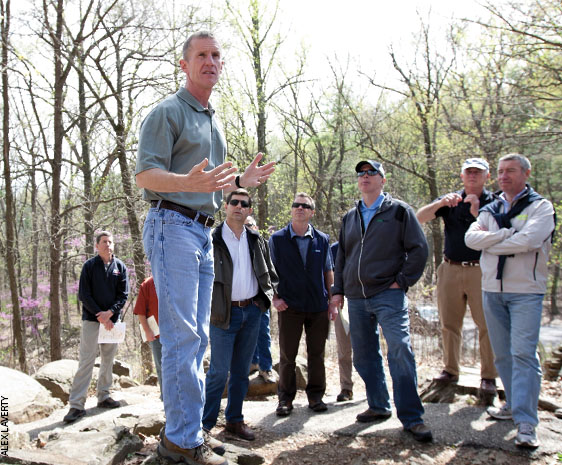
And he writes. He blogs about business on LinkedIn. He pens forewords and introductions to books he admires. He just started a new project, a foreword to a book he’s loved for 40 years, he says. And he recently published a second book of his own.
McChrystal usually writes on trains or planes or when he’s alone in a hotel room. Anywhere he can get a few hours of quiet to think.
He’s very specific about his process, and he loves talking about the different ways people accomplish tasks. First he writes a draft he calls a “30 percent solution.” He calls it that “because it’s 70 percent not good.” That’s usually enough for him to get his mind around an idea, though, and to see where he should be going with something. Then he crafts it or, as he puts it, “I wrestle with it for a while,” reworking and rearranging his words until they have just the right effect. That’s his favorite part, the editing and rewriting. He thinks of it as sculpting.
“I can’t sculpt,” he says. “But if I were a sculptor, as you start to get something that actually looks like what you want, then it starts to be fun. That’s the way I find writing.”
McChrystal has always been drawn to writing. When he was in fifth grade, he was put in a special class taught by a creative-writing instructor, and he loved the exercises they’d do. As a senior in high school, he wrote a 179-page paper about America’s decision not to interfere with the 1954 French colonial struggle in Indochina. At West Point, McChrystal was the managing editor of the literary journal and published several short stories. One was about a soldier who kills a man he mistakes for a terrorist.
When working on a project, he applies the same intense focus that served him for more than three decades in the military. As soon as he’s done with his morning workout, he starts knocking out the day’s most difficult tasks. He might start at 8 a.m. and write until noon or 1 p.m. And he tends to work on whatever he’s writing every day until it’s done.
This is a man who was known for sleeping only four hours a night while in war—“not something I recommend,” he says—and for eating only one meal a day, a habit that started when he was a first lieutenant and thought he was getting pudgy. “I’m not good at eating small meals. Some people can sit down and be very disciplined. When I sit down at a meal, I sort of eat everything I can reach. I know medical people say that’s exactly the wrong formula, but I’ve made it this far.”
McChrystal’s new book, released late last year, is called Team of Teams: New Rules of Engagement for a Complex World. Written with a handful of partners, it’s about
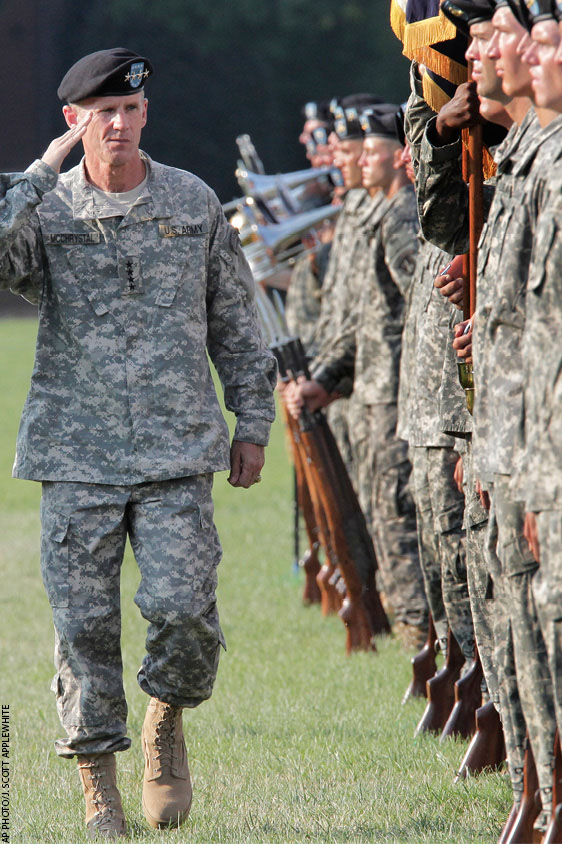 the strategies he implemented to transform the U.S. military and how they can apply to businesses anywhere. The book’s title hints at his proposed solution to most problems: well-equipped groups that communicate effectively both within the group and with other groups.
the strategies he implemented to transform the U.S. military and how they can apply to businesses anywhere. The book’s title hints at his proposed solution to most problems: well-equipped groups that communicate effectively both within the group and with other groups.
If you proposed a formula for a successful business book, it might look like this. Team of Teams has a popular retired general and his team of former Navy SEALs and Yale academics writing about the ability to quickly adapt to changing environments, citing examples from popular culture and the grit of war, with a foreword from Walter Isaacson, who’s known for his best-selling biography of Steve Jobs.
“Walter owed me a favor,” the general says. “I gave a speech at the Aspen Ideas Festival, and he got me to be the chairperson. I spend about 20 percent of my time on that now, so when I ask him to write a foreword to a book, he can’t say no.”
In deep conversation about the book, about his views on the world, McChrystal first makes it clear that he prefers to be called “Stan.” As the talk continues, a steady stream of email pours into his inbox, each dinging as he speaks.
He transformed our fighting forces in Iraq, the approach to insurgents, and the way special operations forces like the Navy SEALs do their jobs. He was in Iraq in 2003 when things began to get bad, when Americans began to realize the nation was in for a prolonged fight. By the time he shifted his attention to Afghanistan in 2009, the situation in Iraq seemed to have improved dramatically.
“It’s important that leaders don’t give people an excuse to not get something done.”
In his book, McChrystal explains that many of the strategies and approaches the military employed to fight the terrorist organizations in Iraq are directly applicable to civilian business leaders. It’s about the ability to respond rapidly and correctly and about the need to adapt in a modern way.
“The reality is, because the environment’s changed, this isn’t an optional thing. This is an essential, necessary thing.”
McChrystal knows all about dealing with change.
Related: The 3 Ways People React to Change
****
There’s something about the way he talks, the way he explains things, that makes you feel smarter. He likes thinking about the abstract, the vague entities and hypothetical businesses. He certainly doesn’t consider himself an intellectual—his wife says he took her to a fast-food restaurant while she was wearing an evening gown—but he’s fascinated by the way things happen. A certain detached curiosity drives him. He’d rather read about artificial intelligence than talk to a stranger any day. He has been that way for as long as he can remember, he says… the kind of kid who spends a year researching a single historic foreign-policy decision.
He grew up in the military, the son of a general, but he also has something of an anti-authoritarian streak, even before it (arguably) got him in trouble. His disdain for useless codes and antiquated habits made him beloved among the troops in his command.
“The military likes to figure out how to do something, put it in a manual or an operating procedure, and perfect doing it, and have everyone do it the same way. I don’t like that. I’m much more fascinated by the idea that there’s not just one right answer to the question. If you do get the right answer, or something that works, that doesn’t mean it will work tomorrow. It just means it worked today.”
His philosophy has evolved over time.
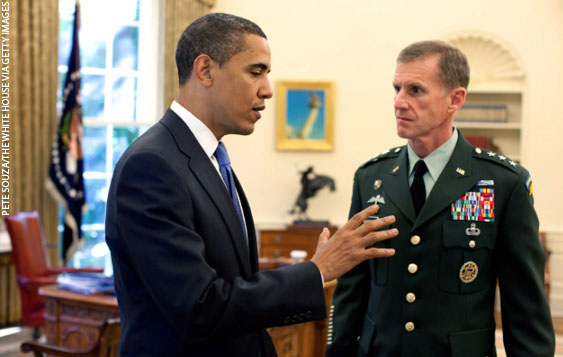
“At one point in my career, if you had asked me what we should do about ISIS, I would have said, ‘OK, well, we’ll find their key points and drop a bomb on those, because that’s a comfortable approach.’ Now I step back and ask, ‘Why does ISIS exist? Why do they succeed?’ Let’s try to understand that. I sort of recoil from the idea that you’re going to pull out a 10,000-mile screwdriver and tweak this thing the right way.”
McChrystal saw this up close. He was out for a run at Baghdad International Airport in early 2004 as rockets fell all around him. That’s when something occurred to him.
“At that point, I’m thinking: We could lose this war. Nobody was even saying war at the time. The word just wasn’t being used. It was ‘That Iraq Thing’ or whatever. We were in denial. But when you’re getting rocketed and your people are getting killed, to me it’s a war. So we internally started saying it’s a war, but we also realized we were going to need to get a lot more flexible in the way we focused our power and maneuvered around the country. All the things that turned out to be so important were evident because we were gonna lose. In spring of 2004, it was starkly obvious that was the case.”
The premise of the book is that Al Qaeda in Iraq was a product of conditions that changed the environment—most notably, our invasion. This was a new opponent, with modern technology that made the environment, in his words, “fundamentally more complex than ever.”
He saw terrorists on different sides of the country communicating faster than similar groups ever had. Terrorist organizations traditionally had been tightly controlled and disciplined, with slow, safe communication that often made the groups more ponderous. Technology allowed these new groups to exploit American weaknesses with crippling precision.
“We were very well-suited to a previous-era opponent,” McChrystal says. “In fact, we had more technology and professionalism. We were almost perfectly designed to go after earlier terrorist groups. Now the situation had changed. We were better than ever. We continued to improve, but now we’re a really good football team, except the sport required is basketball.”
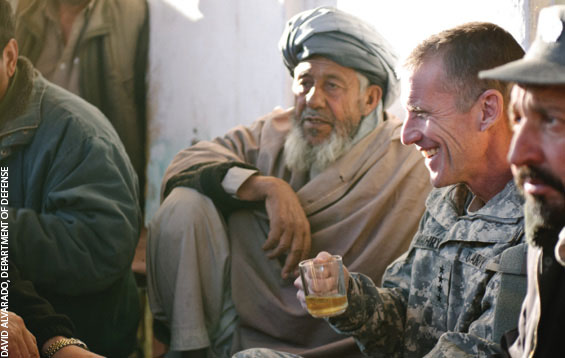
This is one of the first lessons he believes leaders and entrepreneurs can learn from his experience. Most businesses focus on efficiency and predictability. In the past, those are the factors that led to growth.
“For 50 years, that worked really well. Mass gave you great advantages. But now we’re seeing that mass gives you some disadvantages. Google can put 1,000 engineers on a project when a startup has two. But what we’ve found is the garage startups have no legacy disadvantages. They can go whichever direction they want, and if they fail, the cost is low. They can change constantly, and the culture can be adaptive. It just gets created to need.”
He equates this process to Darwinism.
“There are 1,000 of these entities, and the ones that are best-suited for the environment survive. They grow wings or flippers or whatever. And suddenly you’ve got these perfectly adapted things because they’ve adapted to the environment. And the established companies have a really hard time doing that adaptation.”
That’s where McChrystal came in. “The centralized system of decision-making, where you use modern technology to bring data up to the central decision-maker, is good and it’s comfortable, but it just won’t work anymore. It’s just not fast enough, and it’s not adaptable enough because it’s not close enough to the action.”
He persuaded disparate American and international organizations to share information in an expeditious, easily accessible way. It wasn’t a new notion but hadn’t been done effectively up to that point. McChrystal talks about how U.S. forces had “16 or 17 different little bases” around Iraq, and each base was fighting insurgents in different ways—some of which occasionally conflicted. He brought more leaders into morning briefings and tried to push information—not orders—down the chain of command. As the men and women closer to the action had more up-to-date information, he found they could make better decisions.
Related: 5 Ways to Make Sure You Don’t Regret Your Next Decision
There were exceptions, of course—like WikiLeaks, when a low-ranking soldier with access to sensitive information made it public.
“You get very worried, if they’re down there, they’re going to make mistakes,” McChrystal says. “Well, they will. But you’re trying to minimize that by pushing information down.”
“If you take a bunch of really good people and give them broad guidelines, plenty of resources, plenty of flexibility, they’re going to figure it out.”
In his book, he relates an entertaining anecdote from the airline industry. A baggage handler broke a musician’s $3,000 guitar, and the musician spent nine months working through the airline’s labyrinthine phone system to no avail. Finally he wrote a song about it, put it on YouTube and got more than 1 million views. The airline’s stock price fell 10 percent, costing shareholders more than $180 million, roughly 60,000 times the value of the original guitar.
It’s a matter of empowering the right employees.
“If you take a bunch of really good people and give them broad guidelines, plenty of resources, plenty of flexibility,” McChrystal says, “they’re gonna figure it out. They’re gonna be the salmon that swim upstream. If you can create a bunch of those, you’re going to be very successful.”
****
It’s hard to tell how well McChrystal is adapting to life outside the military. He doesn’t play golf, and he doesn’t go fishing or hunting. Aside from one hiking trip to Wyoming with friends every year, he doesn’t take much time away from work. His vocation is also his avocation, he says.
“I have almost no hobbies. When you’re busy in life, you don’t develop them.”
He likes to read, a component of writing, he says. And he likes to study businesses and talk with different leaders. In the corporate world, there are some aggressive types—“gunslingers,” McChrystal calls them. A few are famously successful, he says, but not many.
But instead of aggressiveness, leaders who quickly make decisions enjoy a surer route to success, he says. “People get very slow and cautious in decision-making. I’ve seen some business leaders who are very focused on making rapid decisions and being decisive. The good ones understand that you really need to unlock the potential in your people.”
When he was in JSOC, dealing with the special operations fighters, he noticed that, on the higher teams, the men were more interested in changing their appearance—growing facial hair or wearing more civilian clothing. At some point they came to him and said they thought that wearing hats around all the helicopters might be a potential safety risk. They asked him to change the requirement inside the compound.
“I said, ‘OK, I don’t care.’”
But about six months later some of them came back to him. It seems khaki baseball hats with American flags—not military-issued—had become popular, and they wanted permission to wear them. He noted that just a few months earlier they’d told him that hats were a safety issue, that they could be sucked into the helicopter blades.
“They said, ‘Oh, no, we really want to wear these hats.’ ” McChrystal laughs as he tells the story. “I said, ‘I don’t give a damn what you wear on your head. Here’s what I care about: how we’re going to do these operations.’ ”
He says it’s important that leaders don’t give people an excuse to not get something done. “If you give me a task, but you’ve got this list of things I can and can’t do, you’ve just given me a list of excuses for not doing it. What I tried to do was go to my guys and have that list either be zero or so short that there was no excuse.”
His guidelines? “Typically I’d say, ‘As long as it’s not illegal or immoral, you can do it.’ That challenges people with that mindset, that ego, because there’s nothing to hide behind.”
Part of what makes the special operations forces so powerful is their ability to work on the margins, outside traditional rules. That powerful perception became a weapon itself: The possibility that a force of highly trained, well-armed warriors might show up anywhere in the world, at any time of day—a concept advanced by Hollywood—is a compelling reason for the bad guys not to do something they might otherwise.
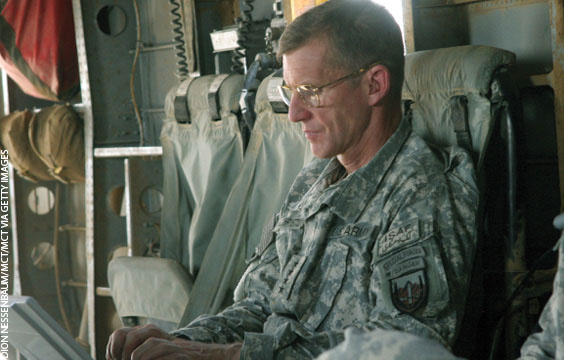
That idea, too, translates to the business world, he says. “If I were a company and I were developing a new technology, like a hand-held device, the biggest fear I’d have is someone like Apple getting that idea or hearing about that idea and coming after me with more expertise, more money, more focus, and they’re just gonna take it. Not by buying the company, but by just overwhelming me. They form a barrier to competition from intimidation.”
Indeed, he says that the opposite—a big company appearing weak—might actually inspire competition that has much less to lose.
There are other lessons, other connections between the military world and the business world. But after more than an hour of talking, of explaining how much startups and terrorists have in common, McChrystal has to go. He has more writing to do.
Related: 6 Leadership Habits, from West Point to You
This article appears in the March 2016 issue of SUCCESS magazine.




